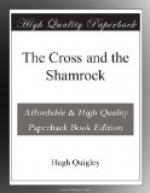The apprehensions of the good priest were not groundless; for no sooner was the body of Mrs. O’Clery consigned to its narrow, cold habitation, than the official, assisting the children into the sleigh that had borne their mother’s body to the tomb, drove off in a rapid trot towards the poorhouse.
“Have we far to go yet, sir?” said Paul, thinking that the “county house” was something different from the much dreaded poorhouse. “I am afraid Bridget will perish with cold, sir.”
“No fears of her; she’s hardy, I guess.”
“Yes, sir, but her dress is so very light.”
“Well, she can pull that ere buffalo around her.”
“Ou, hou, hou!” cried Bridget, breathing on her little bare hands, which she kept pressed to her lips.
“I hope, sir, you are not going to take us to the poorhouse,” said Paul; “we don’t want to go there. The priest that attended my mother—God rest her soul!—told us he would provide for us.”
“Indeed! How can he do so?” said Van Stingey.
“Why, sir, I don’t know; but perhaps he will write to my uncle, who is a vicar general in Ireland, and he will send us money to take us back home.”
“Is your uncle in the British sarvice, then, and a general in the army?”
“No, sir, but he is a priest next to the bishop in station in the church.”
“That’s it, eh? Wal, I guess you better not talk of going back, any how. You must live here in this free country, and learn to be a man and a Christian—a thing you could not be at home, in the old country.”
“I beg your pardon, sir,” replied Paul; “the very best Christians are in Ireland, which was once called the ‘Isle of Saints,’ when all the people were Catholics; and where I came from, even now, they are all mostly Catholics. There are in the whole parish but two peelers, the minister and his wife, and the tithe proctor, or collector of tithes; in all, five Protestants.”
“You are a lad, I see,” said the official, as he dismounted from the sleigh and ordered the children to enter their new home.
“O, woe, woe, woe!” cried they, as they found themselves admitted as paupers, and enclosed within the precincts of the terrible poorhouse. “O Lord, what will we do?” cried they. “O sir, don’t keep us here, or send word to the priest first. I will go to his house, myself,” said Paul.
“Shet up, ye little fools!” said the official; “this is a better place nor ye think. Ye ain’t going to get no potatoes, nohow, but something better than ye ever were used to. Take these young ’uns to the stove in the kitchen,” said he to an under official. And the sobs and groans of the destitute orphans were drowned in the uproarious rumbling of the gong that called the officers of the establishment to dinner, it being now noon.
The repugnance of the Irishman to the poorhouse is proverbial. Neither prison, dungeon, nor death is invested with greater horror, in the minds of the peasantry of Ireland, than this institution. Solely founded, as they are told, for their special use and benefit, there are instances, countless, on record, where the affectionate mother has thanked Heaven, when by fever, plague, or hunger it deprived her of her darling infant, rather than that it should become an inmate of the poorhouse!




